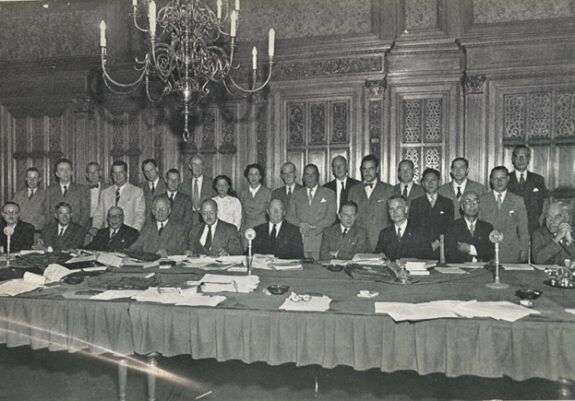Our history stretches back over 150 years, and, during that long period, IPPF has made critical contributions on the international stage. Our roots can be traced to 1872, when an International Prison Commission (IPC) was set up to collect national prison statistics and make recommendations for prison reform. The IPC sought to collect documents and information regarding the prevention of crime and to promote reformation (IPC Regulations, 1880), holding twelve international congresses between the years 1872 and 1950. When the League of Nations was formed in 1919, the IPC became affiliated with the League and held conferences in subsequent years. Eventually, in 1929, the IPC became the International Penal and Penitentiary Commission (IPPC), its name chosen to reflect its work in the area of penal legislation. The United Nations (UN), created in 1945, incorporated crime prevention and standards of criminal justice into its policy role. In 1948 the Economic and Social Council decided that the UN should assume responsibility for action in the area of crime prevention and the treatment of offenders. Following complex negotiations, the IPPC was dissolved in 1951 and its functions were transferred to the UN. The International Penal and Penitentiary Foundation was then created, in July 1951, as a Foundation governed by Swiss law. Its seat continues to be in Bern, Switzerland.

IPPF is not a non-governmental organisation, but, under its originating statute through the General Assembly of the UN, is an association sui generis or unique. The IPC, IPPC, and later the IPPF has played important roles in the creation of the original UN Standard Minimum Rules for the Treatment of Prisoners, and also the UN Minimum Rules on Non-Custodial Measures. In fact, the IPC produced the first version of the Standard Minimum Rules for the Treatment of Prisoners, which were adopted by the League of Nations in 1934. The IPPC, and later the IPPF, revised and expanded these rules to become the 1955 UN rules, resulting in the rules being expanded from 55 provisions to 78. In 1988, the IPPF also contributed to drafting the UN Minimum Rules on Non-Custodial Measures.
The IPPF has also played a part in supporting the development of criminal justice policy worldwide. Since its creation, IPPF has held regular colloquia on issues of central importance and challenges in penal and penitentiary policies and administration, which have led to many publications. In recent years, these books were enhanced through the provision of country reports containing useful information on penal and penitentiary policy topics in countries across the globe. IPPF’s colloquia have acted as supportive forums for international exchange amongst academics, judiciary, penal administrators, policymakers, non-governmental organisations and others affected by and involved in penal and penitentiary policy.
In terms of governance, IPPF has the benefit of the remaining assets of the former IPPC. This link with the IPPC is also found in the membership of the IPPF. Under its statutes, the most recent of which date from 2016, our foundation comprises three committees: the Principal Committee; the Associates Committee and the Fellows Committee. The Principal Committee comprises persons from each country that was an active member of the IPPC at the time of its dissolution. Today, there are twenty-five countries represented: Argentina, Austria, Belgium, Chile, Denmark, Egypt, Finland, France, Germany, Hungary, Ireland, Italy, Japan, Luxembourg, Norway, The Netherlands, New Zealand, Poland, Portugal, South Africa, Spain, Sweden, Switzerland, the United Kingdom, and the United States of America. Each country has a maximum of three members on the Principal Committee, representing academia, judiciary and criminal justice and prison administration giving IPPF its unique structure and range of expertise. The Associates Committee’s members can come from any other country or public or private international organisations working in our field. Our Fellows Committee comprises those who have previously served on the Principal Committee or the Associates Committee. IPPF’s Council is responsible for its administration, and comprises a President, Secretary General, Treasurer and two Vice-Presidents.
